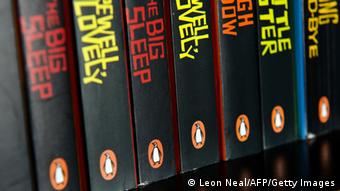 |
| Penguin is known for classics, but has updated its design |
How is this so-called mega-merger going to enable big publishing to compete more efficiently with Amazon and/or self-publishing? I honestly don't know, unless they can build or replace lost bookstores for print books and sell them at profitable prices. Perhaps they actually plan to get into the new publishing model and sell more digital books. But, that wouldn't require any mergers, would it?
Anyone have any idea how just being a bigger 'big traditional publisher' is going to allow them to compete with the new, open-landscape, publishing business model?
The freedom to publish quickly in immediately accessible marketplaces is a cat that is already out of the proverbial bag.
Believe it or not, Amazon sells more printed books in America than all the other booksellers combined! I did not realize that. And they have 60% of the e-book market.
My insight into this merger is that it will not enhance big publishing's power or competitiveness --- but only probably result in further restrictions in an already shrinking publishing medium.
I do not believe that print will ever go away completely. It will be here as long as there is a demand and the publishers continue to develop more cost-effective print publishing means.
Holger Erling writes this for Deutsche Welle (DW):
Penguin Random House Mega-Merger Alters International Book Market
Readers buy e-books on Amazon and writers self-publish online. So why do we still need publishing houses? The recent Penguin Random House mega-merger is one answer to a troubled market.
When media giants Bertelsmann and Pearson in late 2012 announced plans to merge their subsidiaries into what would become the Penguin Random House group, the publishing industry was speechless. With global revenues of 2.5 billion euros ($3.3 billion), the combined company would control a huge portion of the English and Spanish book markets.
High-volume authors like Michael Crichton and E.L. James would share the shelves with respected literary figures like Orhan Pamuk, Salman Rushdie and Gabriel García Marquez. And Penguin Random House's scope would stretch from China to Chile and from New Delhi to New York.
Across continents
A global approach has long been part of the company culture on both sides of the merger, with both having been well positioned in the traditional English-speaking markets in the US, UK, Canada, Australia and New Zealand. Penguin, owned by Pearson, has also been a strong brand in India and China, while Bertelsmann's Random House ranks third on the Latin American book market.
But it's not just market position that makes this merger significant. Penguin dates back to the period between the World Wars, while Bertelsmann and Random House have a nearly 180-year tradition. Many readers who grew up in the UK or in former British colonies know Penguin's inexpensive classics.
Both publishing houses have shown a commitment not only to the mainstream audience but also to supporting the best contemporary authors. Together they have published works by 70 Nobel Prize winners, including German writer Günter Grass.
Since neither the European nor the American cartel authorities had qualms with the merger, it went through more quickly than expected, concluding earlier this week. Both houses had largely been active in the entertainment area, which is strictly regulated by the cartel authorities.
No comments:
Post a Comment